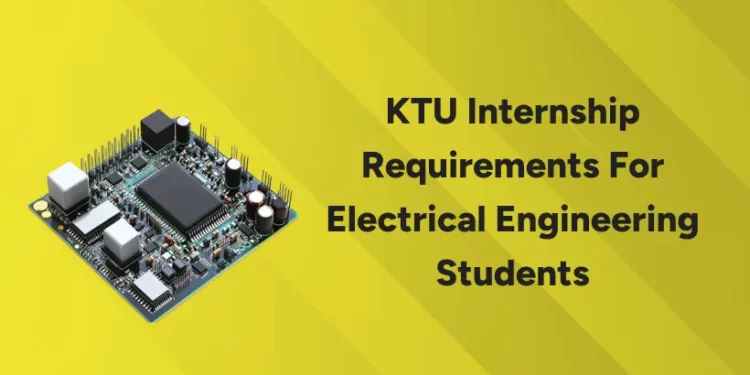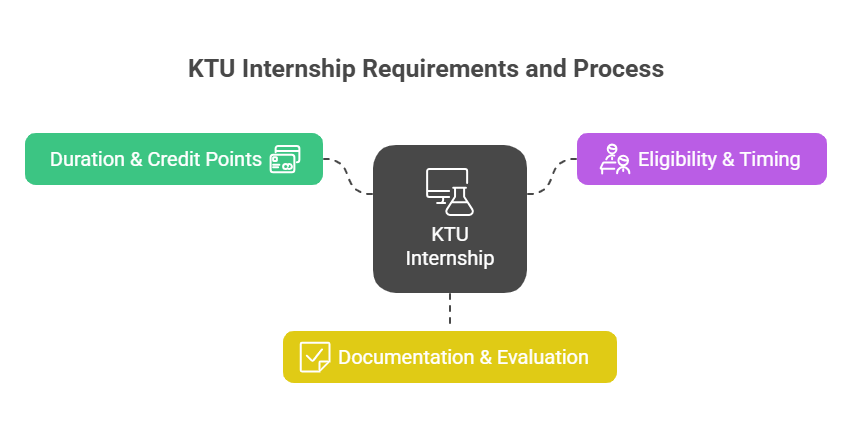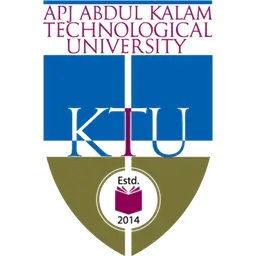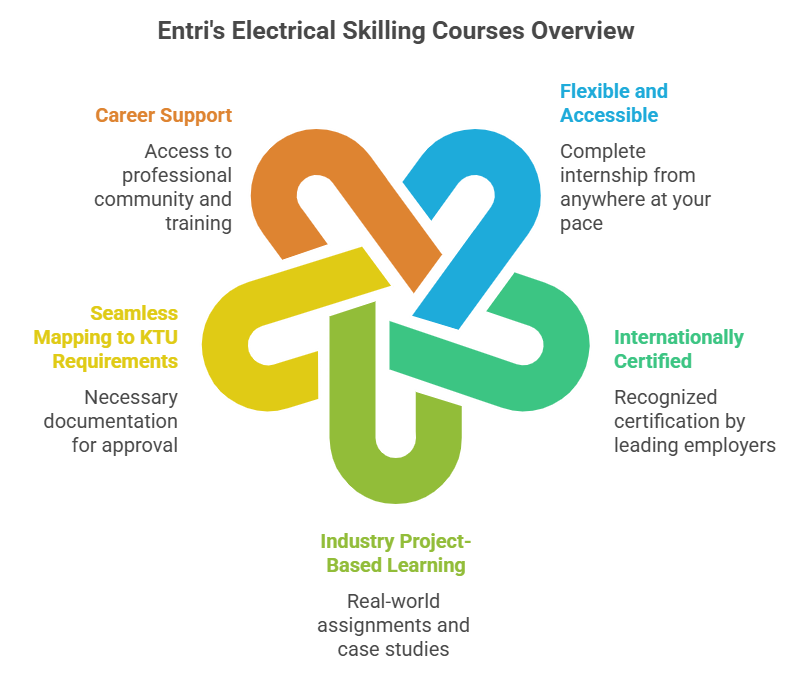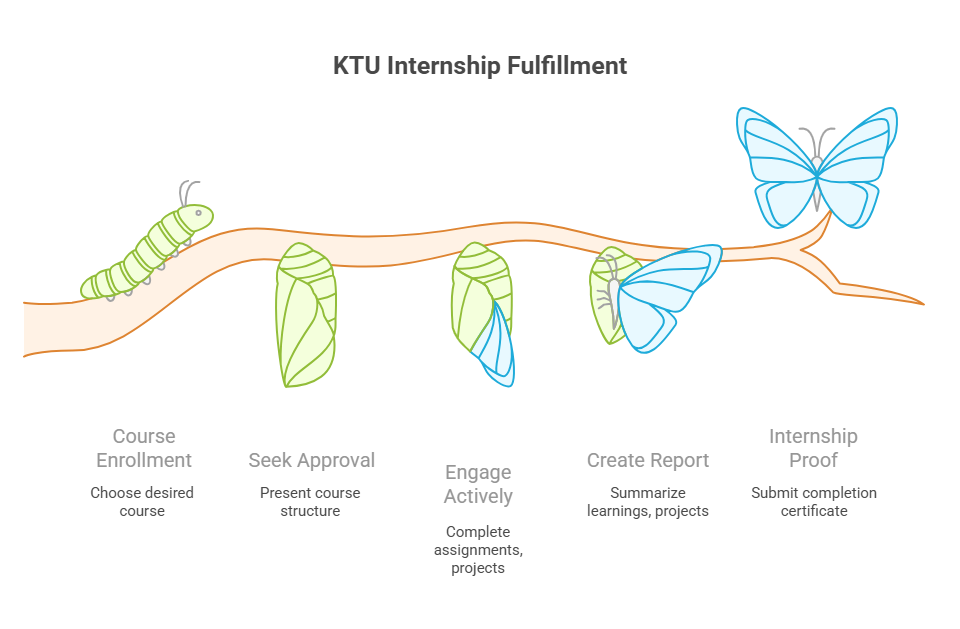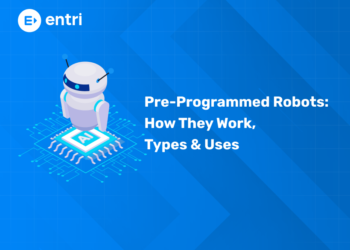Table of Contents
Today’s electrical engineers are more than just wiring diagrams and power circuits. Modern electrical engineering requires adaptability, practical experience and knowledge of new age technologies. Keeping this in mind APJ Abdul Kalam Technological University (Kerala Technological University, or KTU) has made internships as a part of B.Tech Electrical Engineering curriculum. This ensures that students graduate not just with theoretical knowledge but with real industry exposure.
But how can students find the right kind of internship, gain practical skills and meet KTU’s requirements when traditional opportunities are limited? Entri’s internationally certified Electrical Skilling Courses is a smart and flexible solution that aligns with KTU’s goals and today’s industry needs.
In this article, we will go deep into KTU internship requirements for Electrical Engineering students and show how Entri’s courses in MEP Engineering, MEP QS, and Embedded Systems is changing the way students prepare for their career and meet their mandatory internship needs.
Key Takeaways
- KTU Electrical Engineering students must complete a 4 to 6-week internship to meet academic requirements.
- Finding reputable, industry-aligned internships can be hard, particularly in electrical engineering in Kerala
- Entri’s Electrical Skilling Courses in MEP, MEP QS, and Embedded Systems offer internationally certified skills to help students fulfill these internship requirements.
- These courses equip students with practical, industry-relevant skills that enhance employability and job readiness.
Why Does KTU Mandate an Internship?
Duration & Credit Points
Kerala Technological University (KTU) mandates a 4–8 week internship for all B.Tech students across specializations including Electrical Engineering. This internship gives students up to 20 activity points toward their graduation requirements.
Eligibility & Timing
Allowed typically post-semester 6 (i.e., 7th or 8th semester). Students must clear their academic backlogs and adhere to the CGPA requirements set by their department.
Documentation & Evaluation
KTU requires:
-
Internships must be approved in advance by the department and logged in KTU’s academic system.
-
A standardized internship report and a reflective journal are mandatory.
-
Students undergo an internship defense and get evaluated by both the host organisation and an academic supervisor.
Kickstart your embedded systems career and turn your tech passion into high-demand skills!
Master Embedded Systems Programming!
Launch your tech career with our Embedded Systems Course in Kerala, designed for hands-on learning and industry readiness.
Know MoreWhat Common Challenges Do EEE Students Face?
-
Industry access constraints: Many electrical engineering students in Kerala face difficulty securing internships at reputable firms.
-
Logistical & paperwork hurdles: Coordinating schedules, obtaining approvals, and completing official documentation can be complex.
-
Credit uncertainty: Some internships may not align well with KTU documentation rules, risking loss of points.
Core Guidelines for a KTU-Approved Internship
-
Alignment with Curriculum: The internship must allow you to apply electrical engineering theories in practical settings, like site supervision, project management, system design, or testing and commissioning.
-
Approved Providers: Host organizations can include energy utilities, construction and MEP companies, electrical consultancy firms, or R&D labs.
-
Certification: Upon completion, students must secure a valid certification from the internship provider. This certificate becomes part of your academic record and can boost your employability.
Challenges in Traditional Internship Search
-
Limited Opportunities: Not every student finds an industry placement, especially in small towns or during busy academic calendars.
-
Outdated Experience: Some internships may restrict you to observation or only minor tasks, offering little real-world skill development.
-
Lack of Structured Learning: Few traditional internships offer a curriculum with step-by-step skill-building or internationally recognized certification.
That’s where Entri’s Electrical Skilling Courses rise above traditional models, delivering verified, relevant, and practical learning to fulfil KTU’s requirements.
Master Embedded Systems Programming!
Launch your tech career with our Embedded Systems Course in Kerala, designed for hands-on learning and industry readiness.
Know MoreEntri’s Electrical Skilling Courses: A Solution to KTU’s Internship Requirements
Entri provides specialized, industry-aligned courses that fit perfectly with KTU’s internship mandate. Certified internationally, these courses don’t just tick a compliance box; they give you real, in-demand skills. Let’s explore each course:
1. Embedded Systems Course
What You’ll Learn:
-
Design and development of embedded systems using microcontrollers and microprocessors.
-
Circuit design, firmware programming, and real-time operating systems.
-
Automation concepts, IoT framework, and smart device integration.
-
Troubleshooting, debugging, and system optimization.
Why It’s Valuable:
Embedded systems expertise is at the heart of automation, robotics, IoT, and smart manufacturing, some of the most rapidly expanding domains in electrical engineering globally.
Certifications and Benefits:
NSDC; placements in automation firms.
Industry Applications:
-
IoT product development
-
Industrial automation
-
Automotive electronics
-
Smart grids and home automation
2. MEP (Mechanical, Electrical, and Plumbing) Engineering
What You’ll Learn:
-
Complete electrical system design for commercial and residential buildings.
-
Practical installation of wiring, lighting, earthing, and power distribution systems.
-
Best practices for energy efficiency, safety, and sustainable construction.
-
Coordination of mechanical and plumbing systems with electrical layouts for seamless execution.
Why It’s Valuable:
MEP is a cornerstone discipline for both civil and electrical engineers. Gaining MEP expertise means you’re ready to contribute to large-scale construction projects, commercial complexes, or even smart homes, starting from day one.
Certifications and Benefits:
NSDC and international certificates; 100% placement assistance, with alumni in firms like Larsen & Toubro. Benefits: Reduces energy waste by 20-30% in designs, enhances sustainability skills.
Industry Applications:
-
Building services design
-
Project management and coordination
-
Energy consulting
-
Facilities management
3. MEP QS (Quantity Surveying)
What You’ll Learn:
-
Accurate estimation of electrical system costs for buildings and infrastructure projects.
-
Budget management and tracking of project finances.
-
Drafting and reviewing technical specifications for procurement and compliance.
-
Risk management in the context of project costs for the electrical domain.
Why It’s Valuable:
You’ll be able to bridge the gap between engineering design and project economics, an in-demand skill set for roles in project management, procurement, or client consulting.
Certifications and Benefits:
NSDC and international certificates; 100% placement assistance. Reduces energy waste by 20-30% in designs, enhances sustainability skills.
Industry Applications:
-
Cost engineering for MEP systems
-
Construction tendering and bidding
-
Value engineering and cost optimization
Additional Relevant Courses for Broader Skillsets
While focused on electrical internships, students may also benefit from courses traditionally associated with civil skilling, such as BIM, QS, and Structural Design, since large-scale projects increasingly require interdisciplinary knowledge:
-
BIM (Building Information Modeling): Learn how electrical engineers contribute to integrated 3D design, collision detection, and collaborative construction processes.
-
Quantity Surveying (QS): Broaden your capabilities in cost estimation and contract management for entire projects, not just the electrical portions.
-
Structural Design: Helpful for understanding how MEP and electrical systems integrate with structural and architectural elements, critical for project coordination.
Why Choose Entri’s Electrical Skilling Courses?
1. Flexible and Accessible
Complete your internship requirement from anywhere, at your own pace, with access to updated, industry-standard content.
2. Internationally Certified
All courses culminate in recognized certification, respected by leading employers and institutions.
3. Industry Project-Based Learning
Courses are packed with real-world assignments, simulations, and case studies. You’ll finish with portfolio-worthy work and documented evidence of skill mastery.
4. Seamless Mapping to KTU Requirements
Receive all necessary documentation for the department’s approval, including:
-
Course enrollment certificate
-
Detailed course structure and project work
-
Progress tracking and evaluation metrics
5. Career Support
Gain access to Entri’s professional community, placement training, industry masterclasses, and career counseling sessions, helping you translate skills into employment.
How to Fulfill Your KTU Internship Requirement with Entri
-
Enroll in the Desired Course(s):
-
Choose from MEP, MEP QS, Embedded Systems, or any relevant interdisciplinary course.
-
-
Seek Preliminary Approval:
-
Present the course structure and enrollment letter to your department for pre-internship clearance.
-
-
Engage in All Course Activities:
-
Treat the course as your virtual internship. Document progress, complete all module assignments, and participate in live projects.
-
-
Create a Detailed Internship Report:
-
Summarize learnings, hands-on projects, portfolio work, and certifications earned.
-
-
Collect and Submit Course Completion Certificate:
-
This acts as the official proof of internship, recognized by KTU (as per their latest guidelines and the growing preference among colleges for structured edtech certifications).
-
Success Stories: Real-World Impact
Many KTU students have already fulfilled their internship requirement and moved swiftly into full-time jobs, by completing Entri’s skilling courses. Success highlights include:
-
Gaining immediate employment in MEP consulting after project-based learning.
-
Earning placements in automation and IoT-focused startups, leveraging embedded systems knowledge.
-
Receiving job offers from top construction and energy management firms due to powerful cost management (MEP QS) skills.
Watch the full content in video format:
Conclusion
KTU has set a forward-thinking requirement for Electrical Engineering students to complete a meaningful internship. However, not every student gets the industry exposure they need through traditional pathways. Entri’s suite of Electrical Skilling Courses, from MEP and MEP QS to Embedded Systems and beyond, offers a dynamic, reliable, and globally credible way to both fulfil your degree requirements and launch a successful engineering career.
With Entri, you don’t just tick off an internship; you earn job-ready skills, a strong professional network, and the confidence to excel as an electrical engineer in the modern world.
Ready to fulfil your KTU Electrical Engineering internship requirement and elevate your career? Explore Entri’s Electrical Skilling Courses today!
Master Embedded Systems Programming!
Launch your tech career with our Embedded Systems Course in Kerala, designed for hands-on learning and industry readiness.
Know MoreFrequently Asked Questions
What are the KTU internship requirements for Electrical Engineering students?
KTU mandates final-year Electrical Engineering students to complete internships with minimum credit hours aligned to AICTE guidelines. These can be done in industries or through certified training programs like Entri’s.
How many weeks of internship are required by KTU?
Generally, KTU requires 4–6 weeks (about 120–160 hours) of internship training, but this can vary depending on your department’s specific regulations.
Can online certified courses count as internships under KTU?
Yes. KTU recognises industry-certified and project-based online/offline courses such as Entri’s MEP, BIM, QS, and Structural Design courses as valid internship fulfilment.
What are the best internship options for KTU Electrical Engineering students?
Options include internships in power plants, electrical consultancies, renewable energy firms, or structured programs like Entri’s industry-oriented skilling courses.
How do Entri’s MEP and BIM courses help Electrical Engineering students?
These courses provide hands-on training in electrical design, project execution, building management, and advanced tools, making students job-ready while fulfilling internship credits.
Do KTU students receive credits for Entri’s certified courses?
Yes. Entri’s internationally certified courses are aligned with KTU’s internship guidelines, ensuring students get both practical exposure and academic credits.
Is it mandatory to do internships in core Electrical Engineering companies?
Not always. KTU allows skill-based courses in allied fields like MEP, QS, BIM, and Structural Design that are relevant to engineering careers.
Can KTU students do internships during semester breaks?
Yes. Most students opt for summer or winter breaks to complete their internship requirements without affecting academics.
What benefits do KTU Electrical Engineering students gain from Entri courses?
They gain practical industry knowledge, internship fulfilment, globally recognised certifications, and career opportunities in India & abroad.


